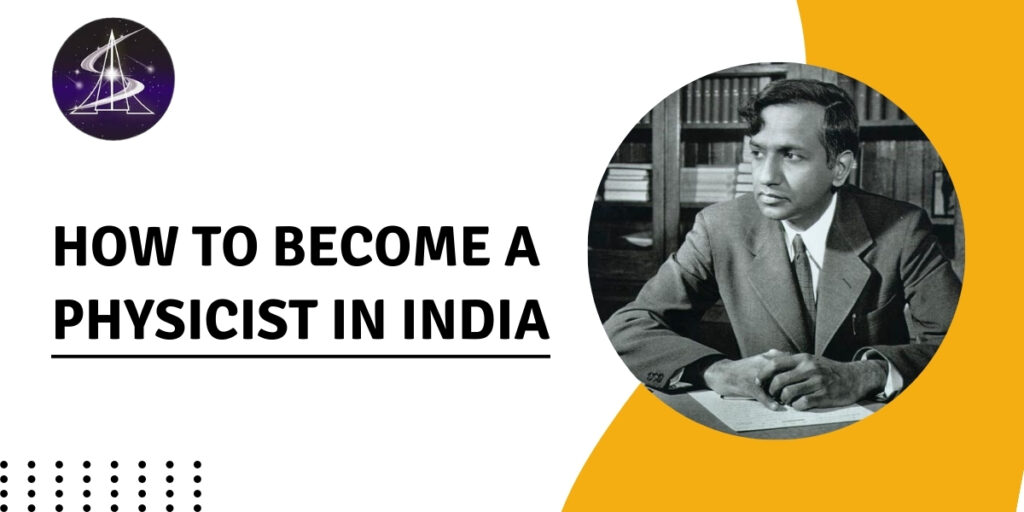Physicists are the detectives of the scientific world who investigate the unseen forces that shape our world, from the tiniest subatomic particles to the vast expanses of space. Physicists are also inventors and innovators, constantly developing new technologies and creating unique tools, from lasers and particle accelerators to telescopes and satellites, that help us see the world in new and exciting ways. CV Raman, MN Saha, Homi Bhabha, etc., are some of the prominent physicists from India. If you are a physics enthusiast and aspire to be a physicist, this blog is for you.
In this blog, we will discuss the following:
- What does a physicist do?
- Types of physicists
- Path to follow
- Scope in India
What do Physicists do?
Physicists work in various fields, including theoretical physics, experimental physics, astrophysics, condensed matter physics, particle physics, and many others. They may work in academia, industry, government agencies, or research institutions.
Some of the tasks that physicists may perform include:
- Developing and testing theories to explain how the universe works
- Designing and carrying out experiments to test these theories
- Analysing data and interpreting results
- Using computer simulations to model complex physical systems
- Developing new technologies and materials based on their understanding of physics
- Teaching and mentoring students and other scientists
- Communicating their findings to other physicists and the general public.
Types of Physicists:
There are many different types of physicists, each specialising in a specific area of physics. However, they can be broadly classified into two categories: theoretical physicists and experimental physicists.
Theoretical physicists are focused on the theoretical research approach. They develop mathematical models, equations and simulations to predict the reasons behind the observations. Their work usually stays ahead of their time and makes sense much later.
Experimental physicists, on the other hand, conduct experiments to gather data and test theories. They design and build experiments and use sophisticated equipment to gather and analyse the data to conclusions. They use their results to refine theories and develop new ones.
There are many other types of physicists. Some of them are:
- Astrophysicists: These physicists study the behaviour and properties of objects in the universe, such as stars, galaxies, and black holes. They often use telescopes and other advanced equipment to gather data. You can check out our other blogs on Astrophysics to learn more about it.
- Particle Physicists: These physicists study the behaviour and properties of subatomic particles, such as electrons, protons, and neutrinos. They often work with particle accelerators and detectors to study particle interactions.
- High Energy Physicists: These physicists study the behaviour of particles and energy at extremely high energies. They may work on topics such as the search for new particles, the behaviour of matter at extreme conditions, or the properties of the early universe.
- Condensed Matter Physicists: These physicists study the behaviour and properties of materials, such as solids and liquids. They may work on developing new materials with specific properties for use in technology and industry.
- Biophysicists: These physicists study the physical processes in living organisms, such as the mechanics of muscles and the behaviour of molecules in cells.
- Nuclear Physicists: These physicists study the properties and behaviour of atomic nuclei and the forces that hold them together. They may work on nuclear energy, radiation, and nuclear weapons.
- Geophysicists: These physicists study the physical properties of the Earth and its atmosphere, including plate tectonics, earthquakes, and the behaviour of the Earth’s magnetic field.
Path to follow
It is essential to have a general understanding of the necessary steps to becoming a physicist. You must be ready to devote your life to physics. You must be well-versed in physics and mathematics. You must develop your observational skills and try to answer problems logically.
Here are some important steps you should take to advance your journey toward becoming a physicist:
- Complete your 10+2 education with Physics, Chemistry, and Mathematics as your main subjects.
- Pursue a Bachelor’s degree in Physics. Try to get into top universities in India like Indian Institutes of Technology (IITs), Indian Institute of Science Education and Research (IISERs), National Institute of Science Education and Research (IISERs), Indian Institute of Science (IISc), etc. These colleges offer a plethora of opportunities and exposure to Basic Sciences.
- After completing your Bachelor’s degree, you can opt for a Master’s in Physics. You can also join the Integrated BS-MS course, a 5 year integrated BSc and MSc course. This will further deepen your knowledge and understanding of the subject. Some of the top universities in India for a Master’s degree in Physics are Tata Institute of Fundamental Research (TIFR), IITs, IISERs, NISER, IISc, etc.
- Pursue a PhD in Physics if you want to become a researcher or a professor in the field. A PhD will provide you with specialised knowledge and training in a specific area of physics and allow you to conduct original research. You can apply for your PhD in IISc, TIFR, IITs, IISERs, NISER, Physical Research Laboratory (PRL), Raman Research Institute (RRI), Institute of Physics (IOP), etc.
- Gain hands-on experience through internships, research projects, and collaborations with other physicists. This will help you build a strong network in the field and also enhance your skills and knowledge. Check out our other blogs to know more about internships.
- Attend conferences and seminars to stay updated with the latest developments in the field.
- After completing your education and gaining some experience, you can start your career as a physicist in academia, research institutions, government organisations, or private companies.
Remember that becoming a physicist requires hard work, dedication, and perseverance. But it can be a rewarding and fulfilling career if you have a strong passion for the subject and are willing to put in the effort.
Scope in India
No country can develop without the contributions of its scientists. Be it nuclear physicist Homi J. Bhabha or Nobel laureate CV Raman, India has produced a lot of physicists.
There is an excellent scope for the young generation in Physics in India. Here we talk about some of them:
- One of the main areas where physicists in India can find employment is research and development (R&D). There are several government-funded research institutions, such as the Indian Institute of Science (IISc), the Tata Institute of Fundamental Research (TIFR), and the Bhabha Atomic Research Centre (BARC), where physicists can work on cutting-edge research projects (for example LIGO-India). Private electronics, telecommunications, and materials science companies also hire physicists for R&D projects.
- Physicists can also pursue a career in academia in India. They can become university and college professors, lecturers, or researchers nationwide. Physicists in academia can conduct research in their areas of interest and also teach undergraduate and graduate-level courses to students.
- Another area where physicists can find employment in India is healthcare. Medical physics is a rapidly growing field that uses physics principles to improve healthcare.
- Physicists can also work in the defence and aerospace industry in India. The Indian Space Research Organization (ISRO) and the Defense Research and Development Organization (DRDO) are two major employers in this sector. Physicists in defence and aerospace can work on developing new weapons, sensors, and propulsion systems for missiles and spacecraft. Read our other blogs to know more about ISRO and DRDO.
- The energy and environment sector is another area where physicists can find employment in India. Physicists can work in the renewable energy field to develop new energy sources, such as solar and wind power. They can also work in environmental science to study climate change and develop solutions for sustainable living.
The salaries and benefits of physicists in India can vary depending on their experience level, the field of specialisation, and the industry or academic institution they work for.
Here are some general ranges of salaries for physicists in India based on various sources:
- Entry-level physicists: INR 3 to 5 lakhs per annum
- Mid-career physicists: INR 8 to 15 lakhs per annum
- Senior physicists: INR 15 to 25 lakhs per annum
- Professors and researchers in academia: INR 8 to 20 lakhs per annum
In addition to salaries, physicists in India may also receive other benefits such as health insurance, retirement benefits, and performance-based bonuses.
Conclusion:
Overall, physicists in India have many career options and can significantly contribute to society through their work. With India’s growing emphasis on science and technology, there are likely to be many opportunities for physicists in the coming years. The field of physics is constantly evolving, and physicists are at the forefront of developing new technologies and solutions for society’s challenges. If you are interested in a specific topic like quantum physics and want to be a quantum physicist, check out our blog on “How to be a Quantum Physicist in India”.
About us – SciAstra guides students who want to become scientists and pursue research by helping them secure admissions to top colleges like IISER, NISER, CEBS, ICAR, CMI, etc.
Our mentors are from the top research institutes like IISER, NISER, IACS, CMI, IISC Bangalore, etc. If you want to prepare for IAT / NEST 2023, you can check out our courses and access live classes, recorded lectures, study material, mock tests, doubt-clearing classes, and much more!
To know more about us, click here OR download the SciAstra App from Play Store!






I believe this web site has some rattling wonderful info for everyone : D.
if you really need to become expert in driving, your really need to enroll in a driving school.